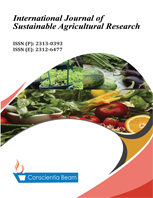Impact of Natural and Hand-Assisted Pollination on Cucumber Fruit and Seed Yield
DOI:
https://doi.org/10.18488/ijsar.v9i2.2975Abstract
Pollination is an important agro-ecological service, necessary for fruits and seed production in 60-70% plant species. The purpose of this study was to demonstrate the importance of artificial pollination on the fruit and seed yield of cucumber in the wake of natural pollination decline. This research was conducted at Faculty of Agriculture and Veterinary Medicine, University of Buea, Cameroon. The experimental design was a randomized complete block design with four treatments and three replicates. The treatments were; open for foraging insects, assisted-hand pollination, hand emasculation, and caged with insect-proof net. Parameters such as number of bees and ants, vegetative and reproductive growth, weight of fruits, number of misshaped fruits, and weight of seeds were recorded. Data collected were subjected to ANOVA, P< 0.05 in SPSS package. Cucumber vegetative and reproductive parameters differed significantly (P<0.05) with highest in Caged with insect-proof net, assisted-hand pollination, and Caged with insect-proof net respectively. The highest number of honey bees were observed in Open for foraging insects 13 and differed significantly (P<0.05) across treatments. The highest weight of fruits and seeds yield was recorded in assisted-hand pollination 31.93 t/ha and 13.23 kg/ha respectively and differed significantly (P<0.05) across treatments. The number of misshaped fruits was highest in hand emasculation 9 and differed significantly (P<0.05) across treatments. Fruit yield correlated positively with number of honeybees (R2 = 0.65). The study demonstrates the significance of artificial pollination in increasing fruits and seed yield of cucumber and the role of honey bees in open pollination.

